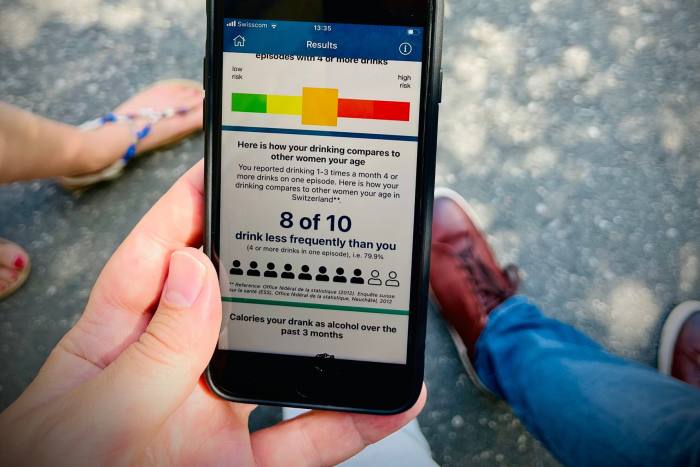Anti-binge-drinking app shown to help students cut down on alcohol
A smartphone app helped students reduce their heavy drinking habits, a study in Switzerland has shown, raising hopes that technology can help reduce harmful levels of alcohol consumption.
Researchers from Lausanne University Hospital and University of Lausanne, working with colleagues in the UK, Canada and US, assessed the effectiveness of targeted intervention to encourage healthier drinking habits in students, with the results showing a 10 per cent decline in average consumption levels.
The findings, which were published in the BMJ on Wednesday, will be welcomed by health officials and behavioural scientists. Alcohol abuse causes 3mn deaths a year, according to the World Health Organization, and excessive consumption is a leading cause of death and physical and mental disability in young people.
The project assessed the impact of a goal-oriented, game-like drinking app called Smaart, designed by the Lausanne researchers in collaboration with the students. They recorded their drinking habits on the app, which has six modules including personalised advice, alcohol consumption monitoring and goals to achieve safe drinking.
“Those who had access to the app drank less over the 12-month period,” said Nicolas Bertholet, the project’s lead researcher, noting “the drinking volume was lower and the number of heavy drinking days decreased”.
The results offered insights into the value of secondary interventions from an app, compared with advice from a medical professional.
“Students were really interested in the project and willing to participate in the development of the app,” he added. “We recruited more than 1,700 students in under 27 hours.”
The study participants were selected from a pool of 34,178 students from across four higher-education institutions in Switzerland, and 1,770 students with unhealthy drinking habits volunteered to take part. Half were randomly selected to use the app for 12 months. All students involved in the study were asked to complete questionnaires at three, six and 12 months.

The impact of alcohol on health can depend on both the overall volume consumed and specific drinking patterns. Global data shows that patterns vary within the population, with multiple UK studies reporting heavier drinking among students.
“According to a health survey for England, 20 per cent of men and 11 per cent of women aged 16 to 24 drink above the low-risk drinking guideline levels,” said Sadie Boniface, head of research the Institute of Alcohol Studies in the UK.
The Swiss study provides evidence that a targeted multimedia intervention can have health benefits for at-risk populations. “This trial had good results, however, students are the prime target group for this kind of intervention,” Boniface said. “Future interventions need to make sure that more marginalised groups are not left behind.”
“This is a well-designed study,” agreed Martin McKee, professor of European public health at London School of Hygiene & Tropical Medicine, who was not involved in the research. “However, we need to remember that this is a highly educated and relatively privileged group of people and we cannot assume the results apply more generally.”
The UK’s National Institute for Health and Care Excellence (Nice) recommended the use of digital and mobile health interventions as a way to reduce alcohol intake in 2020.
Yet further evidence will be required if the smartphone app approach is to be a successful tool in alternative settings and with other population groups, said Boniface. “Apps are not good enough on their own to replace face-to-face interventions.”
This story originally appeared on: Financial Times - Author:Faqs of Insurances




























